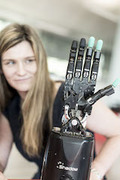- Prospective Applicants
-
Current PhD Researchers
- Careers and Opportunities
- Careers
- Go Global
- Science Shop
-
Supervisors
- Find a PhD
- PhD Manager
Autistic Spectrum Disorder (ASD) is a group of heterogeneous developmental disabilities that manifest in early childhood. Having a child with autism is an emotional, physical, and fiscal feat. This will not only affect the child, but also the family, friends and the community. It is reported that not detecting and diagnosing ASD at a young age, can have major influences on communication, behaviour, social, health and educational development impacting across the lifespan of the person, their families and communities. Such impacts results in a high economic costs exceeding the lifetime costs of asthma, intellectual disability and diabetes.
The early detection of ASD is key to child outcome, allowing interventions to be initiated which promote development and improve prognosis. The lack of clinical resources for early diagnoses has been a long-lasting issue in Low and Middle-Income Countries. Diagnosing ASD has long been more an art than a science. Parent reports, interviews, clinical observation and other mostly subjective methods compose ASD’s diagnostic toolbox. This subjective method does not provide insight on the underlying etiology, and is not suitable for early detection.
This project proposes we can detect ASD in young children at a first level (preclinical stage) using facial emotion recognition, eye tracking and machine learning approaches for quantitative and objective diagnoses of ASD. Studies suggest that children with ASD may have greater difficulty with “subtle emotions like shame, pride, things that are much more socially oriented” - and greater difficulty reading emotions in other people. Therefore, facial emotion recognition is a valuable cue for ASD detection.
The "eye tracking" feature is highly cost-effective. Abnormal eye gaze patterns are indicators of ASD. Using an eye-tracker, this project concentrates the analyses on the differences in eye movement patterns between healthy people and those with ASD.
The aim of this project is to conduct research with multidisciplinary research teams for providing solution for early detection of ASD using an appropriate set of features such as facial emotion features, eye gaze tracking along with machine learning approaches. The proposed computer vision techniques based ASD detection tool can be used to detect autism in children at a first level. Early detection of ASD is important for mental health and wellbeing. This aligns closely with Ulster's strategic research themes of healthy communities. ISRC academics will provide expertise in current machine learning topics, computer vision algorithms while the INHR academics will help to develop the research questions and provide guidance and elicit requirements as well as providing information of the ASD and non-ASD children’s behaviour patterns.
The supervisory team will meet with the student on a monthly basis; at least one supervisory team member from each faculty must attend each meeting to ensure an integrated approach to supervision. To maximise outputs, the research will target a combination of computer science and life and health sciences publications, and also high quality multidisciplinary publications.
Applicants should hold, or expect to obtain, a First or Upper Second Class Honours Degree in a subject relevant to the proposed area of study.
We may also consider applications from those who hold equivalent qualifications, for example, a Lower Second Class Honours Degree plus a Master’s Degree with Distinction.
In exceptional circumstances, the University may consider a portfolio of evidence from applicants who have appropriate professional experience which is equivalent to the learning outcomes of an Honours degree in lieu of academic qualifications.
If the University receives a large number of applicants for the project, the following desirable criteria may be applied to shortlist applicants for interview.
The University is an equal opportunities employer and welcomes applicants from all sections of the community, particularly from those with disabilities.
Appointment will be made on merit.
The University offers the following levels of support:
The scholarship will cover tuition fees at the Home rate and a maintenance allowance of £19,237 (tbc) per annum for three years (subject to satisfactory academic performance).
This scholarship also comes with £900 per annum for three years as a research training support grant (RTSG) allocation to help support the PhD researcher.
Due consideration should be given to financing your studies. Further information on cost of living
Submission deadline
Friday 8 June 2018
12:00AM
Interview Date
13 June 2018
Preferred student start date
Mid September 2018

Telephone
Contact by phone
Email
Contact by email